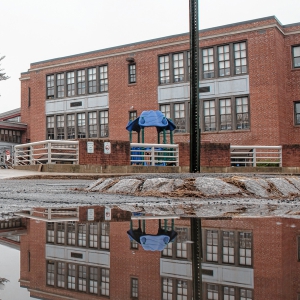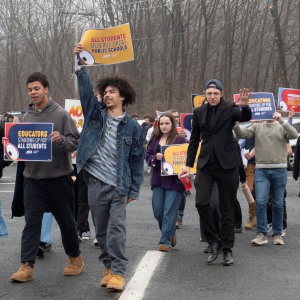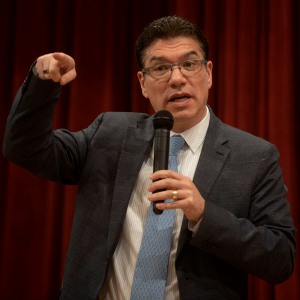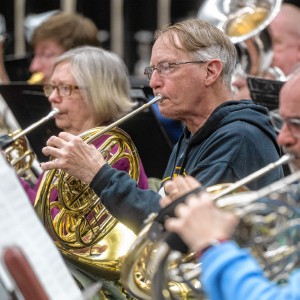Guest columnist William Lambers: ‘The silence heard round the world’

Troops from New York in Corbie, France, celebrate the signing of the Armistice Treaty, Nov. 11, 1918. AP FILE PHOTO
| Published: 11-10-2024 8:32 AM |
The start of the Revolutionary War is known as “the shot heard round the world.” Veterans Day, (Armistice Day) is known for the “silence heard round the world.”
It was Nov. 11, 1918 at 11 a.m. when the guns finally went silent, ending the fighting of World War I. The moments after the Armistice brought about the most beautiful, quiet sound of peace.
An Associated Press article described that moment: “Silence has replaced the roar of cannon and the rattle of machine guns.” The U.S. and Allies had defeated Germany and the Central Powers.
Journalist Philip Gibbs was with the British Army in France at the Armistice. He wrote in the Chicago Tribune “the Fires of hell had been put out. It was silent all along the front … There was no light of gunfire in the sky, no sudden stabs of flame through the darkness, no long, spreading flow above the black trees, where for four years of nights human beings were being smashed to death.”
Back home in the United States the quieting of the guns led to jubilant celebration. In Middletown, Connecticut church bells and factory whistles rang in the morning and a parade started. School and work were called off so everyone could celebrate.
The people in Middletown were quickly reminded of the cost of war. The Hartford Courant reported that news just reached the town that one of its own, Lt. Leonard B. Fuller, was killed in France from an airplane accident. Fuller was a former student at Wesleyan University in Middletown.
My own family experienced a similar tragedy when my great uncle, Ira Pitzer, was killed in France just eight days before the Armistice.
Article continues after...
Yesterday's Most Read Articles
 Northampton schools probe staff response to student’s unfulfilled IEP
Northampton schools probe staff response to student’s unfulfilled IEP
 Nearly all of South Hadley High’s student body holds ‘walkout to walk-in’ rally to oppose cuts, call for funding reform
Nearly all of South Hadley High’s student body holds ‘walkout to walk-in’ rally to oppose cuts, call for funding reform
 UMass Chancellor Reyes outlines changes amid financial uncertainty under Trump administration
UMass Chancellor Reyes outlines changes amid financial uncertainty under Trump administration
 Northampton Housing Authority boss placed on leave
Northampton Housing Authority boss placed on leave
 Hopeful buyers emerge for Magic Wings butterfly conservatory in South Deerfield
Hopeful buyers emerge for Magic Wings butterfly conservatory in South Deerfield
 ‘For the love of music’: Florence Community Band set to hold first-ever multigenerational concert
‘For the love of music’: Florence Community Band set to hold first-ever multigenerational concert
Think how many lives though were saved by the Armistice. But let’s think also how many can be saved today by ending conflicts taking place around the globe.
I think that is the true spirit of Armistice Day — to keep up the mission for a world free from the horror of war. The men and women who went through the First World War experienced a trauma like no other in history before. Surely, the tribute they would want is a world where no one has to experience such horror. We sadly have not lived up to this noble dream as we have seen another world war and many other conflicts.
But Armistice Day reminds us we cannot give up on peace, no matter how hard to obtain.
We also must recognize the consequences of war, which can long outlast the fighting. War leads to food shortages and starvation. Children suffer the most.
Our veterans have often led the fight against the enemy of hunger. After World War I, Lt. George Harrington led a hunger relief mission to Latvia. He also helped secure a cease-fire between opposing forces struggling for power in the country. Harrington also encouraged the start of feeding programs for children at school. That is something every war-torn nation needs to recover.
During World War II, when Gen. Patton’s Third Army was fighting German forces in France, a detachment provided humanitarian aid to refugees. The Third Army’s Detachment C112 “provided emergency hard rations, which included soap, codfish, pulses, biscuits, meat, milk, and chocolate” for French refugees displaced by German troops.
We should never forget those left hungry and displaced by war. Our veterans have not.
The “silence heard round the world” should inspire us all to keep up that quest for world peace. The Armistice brought hope for an end to all wars. That dream must not ever perish in our hearts and minds.
William Lambers is the author of “The Road to Peace and Ending World Hunger.” His writings have been published by the NY Times, Newsweek, History News Network and many other news outlets.






 Columnist J.M. Sorrell: The official language
Columnist J.M. Sorrell: The official language Guest columnist Kristin DeBoer: Let’s stand together for the valley you love
Guest columnist Kristin DeBoer: Let’s stand together for the valley you love George W. Kriebel Jr.: Cruelty in the name of efficiency
George W. Kriebel Jr.: Cruelty in the name of efficiency Michael Sullivan: We are better than this
Michael Sullivan: We are better than this
